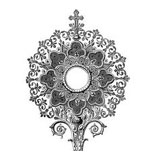
From Protestantism to Catholicism, From the Novus Ordo Mass to the Tridentine Latin Mass
WAKING UP CATHOLIC
A conversion story, like any story, is something of a reconstruction, limited by the clues available to one presently and by the gulf of time. Just as one cannot step into the same river twice, neither can one see with the same eyes one had at some previous point in life. What follows then is my reconstruction of the path by which I have become a traditional Roman Catholic. When I look back now, even with the illumination of hindsight, I cannot apprehend in one glance — or even in many glances — the whole of it. I see in the distance where the trail begins and bits of sunlit footpath between here and there, but much of it remains in obscurity. These are the limitations of human memory and understanding. Nevertheless, I find myself here now — and for poignant reasons, which I will try to explain.
It seems logical that any convert might have two internal forces at work: the movement away from one thing and the movement toward something else. This was certainly the case for me in 1989 when I converted to the Catholic Church. For two years prior I had been moving toward Catholicism, and for several years before that I had been moving away from Protestantism. To understand more precisely the nature of this movement away, I must make clear what it was not: It was not a movement away from belief.
I was born into a Lutheran home and baptized as an infant. My parents taught me at a very young age to believe in the Trinity, the Incarnation, the Crucifixion, and the Resurrection. My parents also made clear to me that Christ died for my sins and that if I would accept Him as my Lord and Savior, He would live in my heart in this life and take me to Heaven in the next. I have never stopped believing any of these things. Then again, these things cannot rightly be attributed to Protestantism, at least not in their ultimate origin. These beliefs, understood generally, are truths the Protestant Reformers took with them when they broke away from the Church and started their own versions of Christianity.
You May Also Enjoy
Don't let any pastor say no to celebrating Divine Mercy Sunday at every Mass that day, just like any other feast day.
What happened during the thousand years from Constantine to Jogaila that made Europe Christian? And how did it work?
We need a clearer understanding of the Church’s relationship with her past and her tradition that will help guide us along the uncharted road ahead.

